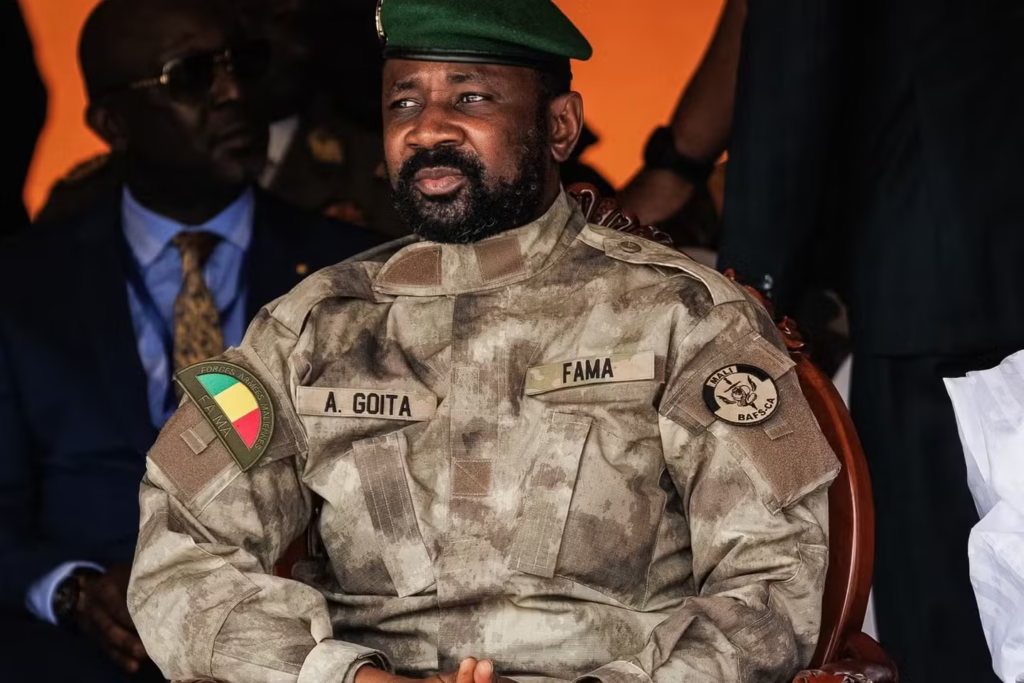BAMAKO, Mali — A national conference convened in Mali’s capital has formally recommended that Colonel Assimi Goita, the military officer who seized power in a pair of coups in 2020 and 2021, be appointed president for a full five-year term, further entrenching the junta’s rule and sidelining the country’s long-stalled return to democratic governance.

In a statement issued Tuesday, the national dialogue — composed of political actors, civil society representatives, and other stakeholders — endorsed Goita’s leadership as the country’s official president and proposed sweeping political reforms, including the immediate dissolution of all existing political parties. The forum also called for stricter criteria for the formation of new parties, citing a need to restructure what it described as Mali’s fractured political landscape.
The recommendations from the forum, held in Bamako, are expected to be implemented in the coming days, further solidifying the military’s grip on power in the West African nation.
Goita, 41, a former special forces colonel who rose to prominence after leading two consecutive coups, has served as Mali’s de facto head of state since being named “President of the Transition” in 2021. In October 2024, he was elevated to the rank of five-star general — a symbolic gesture that underscored the military’s central role in Mali’s governance.
While the junta initially pledged to restore civilian rule through democratic elections scheduled for February 2022, that timeline has been repeatedly postponed. The regime has cited persistent insecurity — including violent insurgencies by jihadist groups linked to al-Qaida and the Islamic State — as justification for delaying elections.
The decision to recommend Goita for a five-year term, as well as to dismantle the current political party system, raises serious concerns among international observers and Malian pro-democracy advocates who argue the junta is veering toward authoritarian rule under the guise of security and reform.
The national dialogue was organized by the transitional authorities as part of an ongoing effort to shape the country’s future political system. However, key opposition parties and major civil society groups boycotted the proceedings, claiming the process lacked transparency and legitimacy.
Despite widespread criticism, Goita and his allies have maintained broad control over the political landscape, bolstered by alliances with foreign military contractors and a growing disengagement from Western partners. Mali formally withdrew from the G5 Sahel military alliance in 2022 and has deepened ties with Russia, including security cooperation with the Kremlin-linked Wagner Group.
The junta has argued that its continued rule is necessary to stabilize Mali, where extremist violence has displaced hundreds of thousands and undermined state authority across large parts of the country. Since 2012, jihadist insurgents have exploited ethnic tensions and weak governance, expanding their reach beyond Mali’s northern deserts into central and southern regions.
Tuesday’s recommendations — particularly the proposal to dissolve all existing political parties — mark a dramatic shift in Mali’s post-coup political trajectory. The move, if implemented, would effectively erase the country’s current political architecture, potentially replacing it with a military-backed system with limited space for dissent or opposition.
It remains unclear how or when these proposals will be formalized into law. No date has been set for new elections, and the transitional government has not publicly committed to a new electoral timeline.
The developments in Mali come amid growing regional instability, with neighboring Burkina Faso and Niger also under military rule following coups. The three Sahel countries recently formed the Alliance of Sahel States, signaling a shared resistance to external pressure for democratic transitions and increased cooperation among military-led governments.



